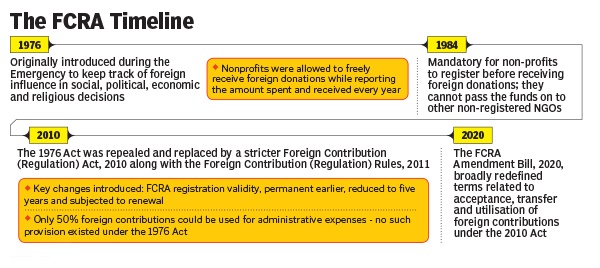All About FCRA Bill 2020
Page Contents
www.carajput.com; Foreign contribution (regulation) amendment bill, 2013
Key Highlights FCRA Amendment Bill 2020
- Suspension in the event of a violation: Ministry of Home Affairs MHA will have the power to suspend the FCRA bank account in the event of any violation of the FCRA rule.
- Aadhaar of members of the board & passport copy and OCI Card: Organizations submitting for registration, prior authorization or renewal of FCRA registration shall be allowed to include, as an identity document, the Aadhaar number of all of their officeholders or directors or other main officials, by whatever name they call, provided under Aadhaar (Targeted Delivery of Financial and Other Subsidies, Benefits and Services) Act, 2016, or a copy of the Passport or Overseas Citizen of India Card, in case of a foreigner.
No-Sub-Granting:
- no entity that is registered and has received a certificate or has acquired prior authorization under FCRA and receives any foreign contribution shall pass such foreign contribution to any other organization.
- This change would be a major blow to NGOs working collaboratively on projects and initiatives, which could also put ‘foreign funding agencies’ or ‘foreign grant-making organizations’ listed under the FCRA in difficulty.
- FCRA Bank Account with SBI: The bill now recommends that organizations that have been granted registration or prior authorization under FCRA shall receive a foreign contribution only in an account designated as “FCRA Account” by the bank, which shall be opened by the bank for the purpose of remittance of a foreign contribution to that branch of the SBI in New Delhi, as stated by the Central Government.
The rationale for amendment:
- The rationale of the Indian Government for these drastic and tedious amendments can be found in the Declaration of Items and Reasons. Statement to the contrary:
-
- The cumulative inflow of foreign contributions almost doubled between 2010 and 2019, but many beneficiaries of foreign contributions did not make use of the same for the purposes for which they were registered or given prior authorization under the stated Act.
- Most of them have also been found lacking to ensure simple regulatory compliance, such as the filing of annual reports and the management of correct accounts.
- Criminal investigations have also had to be launched against hundreds of such non-governmental organizations that have allowed foreign donations to be totally misappropriated or misused.
- It is therefore important to streamline the provisions of the said Act by strengthening the enforcement process, increasing accountability and transparency in the receipt and use of thousands of crores of ropes each year, and by promoting genuine non-governmental organizations or associations working for the welfare of the people.
Voluntary withdrawal of the registration of FCRA – Boon or Bane? :
- MHA may authorize any organization to surrender the certificate granted under this Act if, after carrying out such an investigation as it deems necessary. MHA is comfortable that that organization has not contravened any of the provisions of FCRA, and the management of foreign contribution and properties, if any, resulting from such contribution has been entrusted to the competent authority as provided for in Section 15(1).
- Although this amendment may appear to be a benefit for entities that are no more interested in obtaining foreign funds, it will be a ban on organizations that may have produced assets ( e.g. colleges, hospitals, vocational training centers) from foreign funds.
Upon surrender of the FCRA registration, resources obtained from foreign donations may also have to be transferred to the competent government author.
- Investigation prior to the renewal of FCRA: it is now proposed that MHA, prior to the renewal of the certificate, make such an inquiry as it deems necessary in order to satisfy itself that such organization has fulfilled all the requirements set out in Section 12(4) of FCRA 2010, i.e. the filing of annual returns on-line Form FC-4, quarterly intimation, etc.
- Admin expenditure cap: presently, organizations are permitted to spend up to 50% of the foreign funds earned during the fiscal year on admin spend. The Bill now aims to limit it to twenty percent of the cost of paying wages, professional fees, energy costs, travel, and other expenditures.
In summary, the following are the major modifications to the FCRA:
- Darpan ID is now only required on an optional basis on the Annual Return Form FC – 4. The DarpanUser ID application no longer requires a necessary DarpanUser ID.
- The obligation to declare the association’s name has been deleted from Section 1 of the Form FC-4, leaving only the date of registration acquired under the FCRA.
- The part titled “Interest Income and Other Receipts” in the form has been split into two sections: (1) Interest Revenues, and (2) Other Receipts from Projects/Activities for thorough reporting of other incomes received.
- As the clause ‘foreign contributions received beyond Rs 20,000′ has been eliminated from the form FC-4, the Annual Return now demands reporting of all remittances received throughout the year. This also means that all foreign remittances below Rs 20,000 must now be recorded.
- All details concerning the use of the remittance/contributions received, including any transfers to any bank or Fixed Deposit accounts, must be included in the Annual Return.
- If the contribution was transferred to another organization or if the donation resulted in the creation of assets, Section 3(c) of the annual return must be completed.
- The Annual Return, i.e., Form FC-4, has been established specifically for reporting all utilized lands and holdings made with foreign contributions/remittances over the previous two years, with the addition of Section 6.
These changes to the FC4 form are greatly appreciated. It will bring deviant organizations more public attention and, perhaps, examination, because commoners will be able to link them to a publicly visible asset (such as an orphanage or a school on one’s street or neighborhood).
Popular article :


